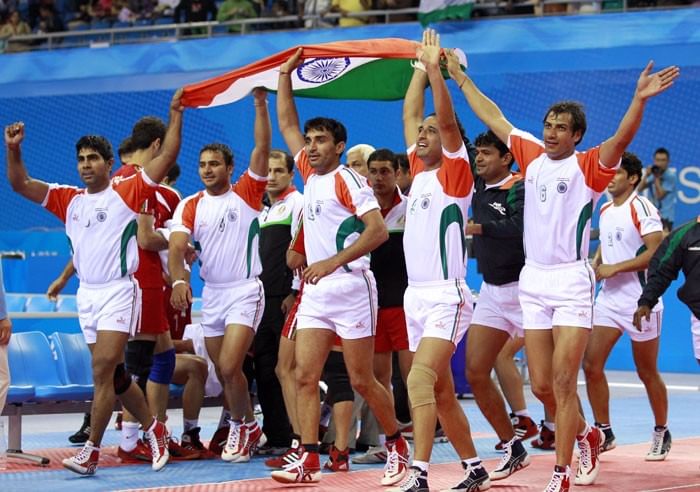India's very own sport - kabaddi - has been the talk of the town ever since the inception of Star Sports Pro Kabaddi back in 2014. The second season of the league built upon the resounding success of the inaugural edition. Players from all over the world participated in the tournament while the league was watched globally.However, one thing that kabaddi is not is an Olympic sport.For a sport to be considered to be part of the Olympics, it must be widely practiced around the world - 75 countries across 4 continents. Kabaddi has seen an exponential growth in popularity and this would be just a formality in the near future.Despite popularity, there are plenty of reasons why kabaddi should be part of the biggest multi-sport event in the world.Here are 5 reasons why kabaddi should be included in the Olympics:
#1 India\'s dominance

India has been completely dominant in kabaddi at the international level. The Indian national kabaddi team has won all the Asian Games gold medals available in both categories – men and women.
The South Asian countries are extremely good at kabaddi, with India at the top of the pile. If kabaddi is included in the Summer Olympics, India is sure to earn 2 gold medals, barring any shock results. In no time, India, in kabaddi alone, would have as many Olympic medals as it had won in hockey during the nation’s glory days in the sport.
#2 Physicality and Agility

Kabaddi is an extremely fast sport. It takes just 40 minutes for a match to be decided. These 40 minutes are packed with exhilarating action as two teams face off in a battle of strength and speed. The viewers are sure to have their eyes fixed at the event, which would take less time than an episode of a TV series.
The players participating in kabaddi need to be extremely fit and agile. The Olympics, which showcases the fittest athletes in the world would be a richer competition if the brawn and swiftness of kabaddi players is added to it.
#3 A global sport

Kabaddi is a widely followed sport. Countries like Bangladesh, Nepal and Iran have chosen kabaddi as their national sport. The sport is played all over the world with a variety of countries from Spain to Kenya, Japan to Canada, Poland to Argentina and a lot more participating in the kabaddi World Cup apart from the Asian nations.
Olympics requiring a sport to be played in 75 nations across 4 continents to include it in the Games. The number of countries and continents has never been in question in kabaddi, but the lack of a professional kabaddi association and league hampers the sport’s chances of being part of the Olympics. So, if all the countries who play kabaddi invest in making it a professional sport in their country, kabaddi can put forth their name for consideration.
#4 Viewership

Kabaddi is a widely followed sport and the viewers are not far behind due to the exciting nature of the sport. Who does not like to watch action, speed, strength and agility packed in 40 minutes?
Kabaddi is watched all over the world. The first match of season 1 of Star Sports Pro Kabaddi was witnessed by 10 times the number of people who tuned in to see the opening match of the 2014 FIFA World Cup in India. Being the 2nd most populated country in the world, it is no mean feat and the stat becomes more shocking when we get to know that this figure saw an increase of 45% in the second season. Football’s popularity is well known and to see the biggest event in the sport surpassed easily by a kabaddi match is welcome news for fans of the sport.
#5 Rich History

Kabaddi has a rich history behind it. The origins of the game are traced back to almost 4000 years ago. In recent history, Maharashtra and Tamil Nadu are credited with the birth of modern kabaddi in the early 20th century when the sport was given an organization in the two states.
The 1936 Berlin Olympics also witnessed kabaddi being demonstrated amidst much fanfare. Moreover, kabaddi is played at the Asian Games, South Asian Games and the Asian Beach Games apart from the World Cups on a regular basis. It will be a travesty to see this sport stagnate due to the lack of an involvement in the biggest event in sport in the world.

